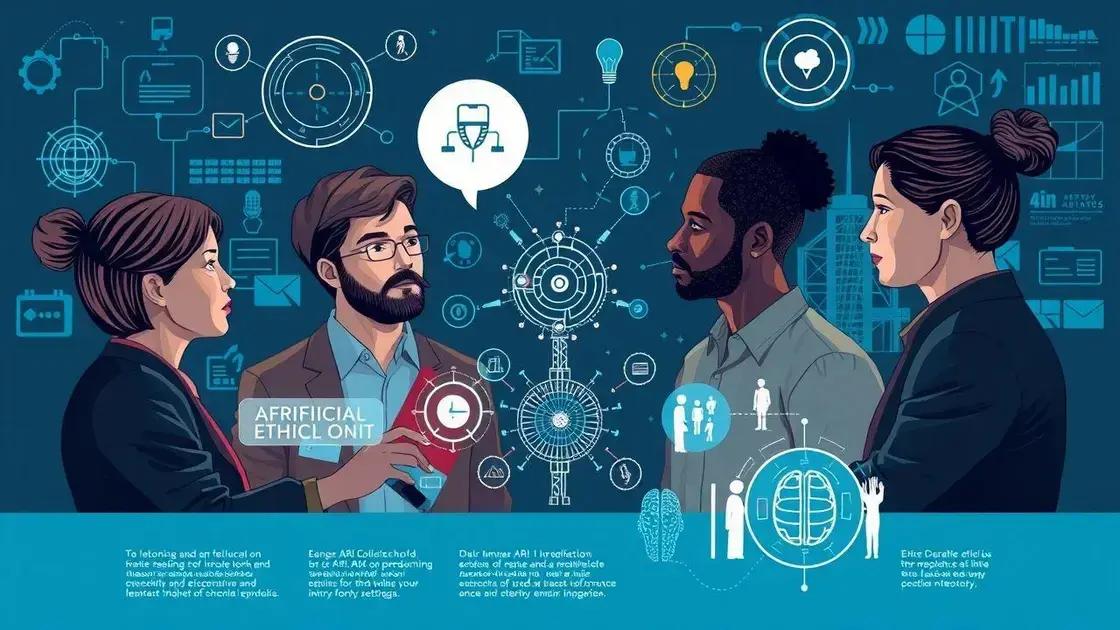Artificial intelligence ethics debate: exploring the core issues

The artificial intelligence ethics debate focuses on the critical issues of fairness, accountability, and transparency, essential for ensuring responsible AI development while safeguarding individual rights and societal well-being.
The artificial intelligence ethics debate is a pressing issue, as it affects our daily lives and the technologies we rely on. Have you ever wondered how these decisions impact society and individual rights? Let’s dive deeper into this complex conversation.
Understanding the fundamentals of AI ethics
Understanding the fundamentals of AI ethics is crucial in today’s world. As AI continues to evolve, we must consider the ethical implications of its use. Various factors like fairness, transparency, and accountability play significant roles in ensuring that AI systems benefit everyone.
Key Principles of AI Ethics
There are several guiding principles that can help us navigate the complexities of AI ethics.
- Fairness: It’s essential to design AI systems that treat all individuals equally, preventing bias and discrimination.
- Transparency: Users should be aware of how AI systems operate and make decisions, ensuring accountability.
- Privacy: Protecting individual data is crucial; AI systems must adhere to strict data handling guidelines.
- Accountability: Developers and organizations must take responsibility for the outcomes of their AI technologies.
As we explore these principles, it’s important to note that the ethical considerations extend beyond technical aspects. Trust in AI systems comes from understanding the impact they have on society.
Impact of Ethical AI
Ethical AI not only fosters trust among users but also encourages innovation. When we prioritize ethics, we pave the way for responsible technology that serves a larger purpose. It’s vital for stakeholders, including governments and private companies, to collaborate on establishing guidelines and standards.
The conversation surrounding AI ethics is expansive. It touches upon issues like job displacement, surveillance, and decision-making processes. Every time we implement AI, we must ask ourselves: Who benefits? and Who might be harmed? By keeping ethical considerations at the forefront, we can strive for a future where AI systems positively impact society.
Key ethical challenges in artificial intelligence

Key ethical challenges in artificial intelligence are fundamental to understanding how we can manage and implement these technologies responsibly. With AI systems becoming increasingly prevalent, we face numerous challenges that must be addressed to ensure they are beneficial for all.
Challenge of Bias
One major issue is the potential for bias in AI systems. Algorithms can unintentionally reflect the prejudices present in their training data. This can lead to unfair treatment of certain groups, causing significant harm.
- Algorithmic bias: Algorithms trained on biased data may lead to discriminatory outcomes.
- Impact on society: Bias can exacerbate existing inequalities.
- Need for diverse data: Ensuring representation in training data is essential.
Addressing bias requires active efforts in sourcing data and refining algorithms. Organizations must prioritize the development of ethical guidelines that minimize these risks.
Privacy Concerns
Another ethical hurdle revolves around privacy. AI systems often require vast amounts of data to function effectively. This raises the question of how much personal information is too much?
Maintaining user privacy while leveraging AI for insights is crucial. Clear policies on data usage and storage can help build trust among users.
As companies collect data, they must do so transparently and ethically. Users should have control over their data, allowing them to opt out of data collection when necessary.
Accountability in Decision-Making
Accountability is yet another critical challenge in AI. When AI systems make decisions, it can be unclear who is responsible for the outcomes. If a self-driving car gets into an accident, who is liable—the manufacturer, the software developer, or the user?
Developing clear accountability frameworks is vital. Stakeholders must establish who is responsible in situations where AI impacts lives. This clarity helps ensure that responsibility for AI actions is well-defined.
Real-world examples of ethical dilemmas in AI
Real-world examples of ethical dilemmas in AI showcase the complexities and challenges we face with technological advancements. Numerous cases have surfaced, raising critical questions about fairness, accountability, and transparency.
Facial Recognition Technology
One prominent example is the use of facial recognition technology. While it has applications in security and law enforcement, it has also led to significant ethical concerns.
- Privacy violations: This technology can invade personal privacy without consent.
- Racial bias: Studies have shown that facial recognition systems often misidentify individuals of color more frequently than white individuals.
- Misuse by authorities: There’s a risk of surveillance becoming oppressive, leading to injustices.
These issues illustrate the balance needed between security and individual rights. Innovations must consider these ethical implications seriously.
AI in Hiring Processes
Another ethical dilemma arises from automated hiring processes. Companies increasingly use AI to screen job applicants, but this practice is not without flaws.
AI systems can inherit biases from historical hiring data, leading to unfair treatment of candidates. For example, if a company has historically favored certain demographics, the AI could perpetuate these biases when selecting candidates. To combat this, organizations must ensure that their AI tools are regularly audited for fairness.
Autonomous Vehicles
Autonomous vehicles present yet another ethical challenge. These vehicles must make split-second decisions in critical situations. When faced with an unavoidable accident, how should the vehicle prioritize safety?
This dilemma raises questions about programming ethics. For instance, should a car prioritize the safety of passengers over pedestrians? These scenarios highlight the moral choices that engineers and manufacturers must confront as they develop self-driving technologies.
Future perspectives on AI ethics and society

Future perspectives on AI ethics and society are essential as we navigate rapidly advancing technology. As artificial intelligence continues to integrate into various aspects of our lives, the ethical considerations surrounding it become even more critical.
Emerging Areas of Ethical Concern
As AI evolves, new ethical dilemmas are likely to emerge. For instance, advancements in deep learning and automation will prompt discussions about job displacement and the economy.
- Job automation: Many jobs could become obsolete, creating economic shifts.
- AI in healthcare: How do we ensure responsible data use while improving patient care?
- Global disparities: Different countries may face varying challenges in managing AI ethics.
These concerns highlight the importance of proactive discussions surrounding AI regulations and frameworks. It is vital to create systems that prioritize human well-being and fair treatment.
Collaboration for Ethical Development
Collaboration between technologists, policymakers, and ethicists will be crucial in shaping a positive future. Engaging multiple stakeholders can lead to comprehensive guidelines to address ethical issues thoughtfully.
Fostering an environment where diverse voices are heard ensures that solutions account for all perspectives. As we look towards the future, education plays a crucial role in building awareness and understanding of AI ethics among the next generation of innovators.
Building Trust through Transparency
Trust is a vital component in the successful integration of AI into society. For AI technologies to be widely accepted, they must operate transparently. Users should understand how algorithms function and how decisions are made.
Improving transparency not only enhances trust but also encourages accountability among developers and users alike. Clear communication will help mitigate fears about AI and its implications on society.
FAQ – Frequently Asked Questions about AI Ethics
What are the main ethical challenges in AI?
The main ethical challenges in AI include bias, privacy concerns, accountability, and transparency in AI decision-making.
How can collaboration improve AI ethics?
Collaboration among technologists, ethicists, and policymakers helps create responsible guidelines and standards for AI development.
Why is transparency important in AI?
Transparency is crucial because it builds trust by allowing users to understand how AI systems make decisions and utilize their data.
What role does accountability play in AI?
Accountability ensures that developers and organizations are responsible for the outcomes of their AI systems, fostering ethical practices.






